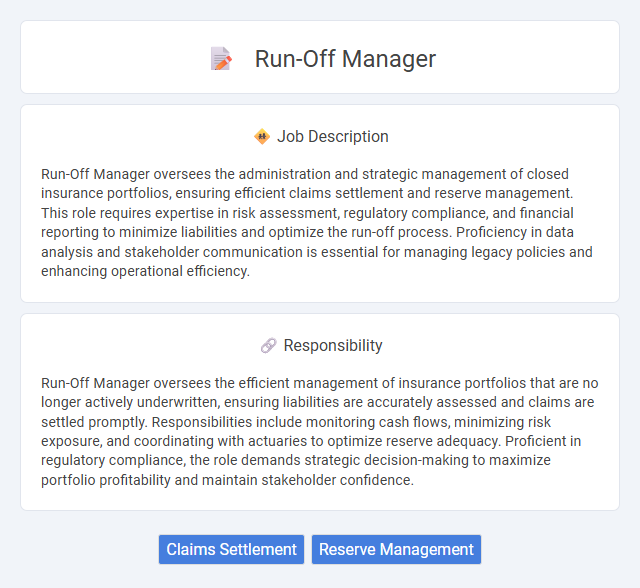
Run-Off Manager oversees the administration and strategic management of closed insurance portfolios, ensuring efficient claims settlement and reserve management. This role requires expertise in risk assessment, regulatory compliance, and financial reporting to minimize liabilities and optimize the run-off process. Proficiency in data analysis and stakeholder communication is essential for managing legacy policies and enhancing operational efficiency.
Individuals with strong analytical skills and attention to detail are likely to be suitable for a Run-Off Manager role, as the job demands careful evaluation of legacy insurance portfolios and risk management. Those who thrive in structured environments and possess experience in claims administration or financial analysis may find a higher probability of success in this position. Candidates lacking patience or the ability to manage long-term projects could face challenges in adapting to the responsibilities inherent in run-off management.
Qualification
A Run-Off Manager requires extensive experience in insurance claims management, financial analysis, and risk mitigation to effectively oversee legacy insurance portfolios. Strong knowledge of regulatory compliance, actuarial principles, and reinsurance contracts is essential for optimizing run-off strategies and ensuring accurate reserve setting. Proficiency in data analytics, project management, and stakeholder communication further supports the successful administration and closure of run-off portfolios.
Responsibility
Run-Off Manager oversees the efficient management of insurance portfolios that are no longer actively underwritten, ensuring liabilities are accurately assessed and claims are settled promptly. Responsibilities include monitoring cash flows, minimizing risk exposure, and coordinating with actuaries to optimize reserve adequacy. Proficient in regulatory compliance, the role demands strategic decision-making to maximize portfolio profitability and maintain stakeholder confidence.
Benefit
Run-Off Manager roles likely offer significant benefits including enhanced risk management expertise and the opportunity to lead complex insurance portfolio closures. Professionals in this position may gain valuable experience in regulatory compliance and financial optimization, which can increase career advancement chances. Access to cross-functional collaboration with underwriting, claims, and actuarial teams may further improve strategic decision-making skills.
Challenge
The Run-Off Manager role likely involves navigating complex, legacy insurance portfolios that require meticulous analysis and strategic decision-making to minimize financial risks. Managing the uncertainty of claims development and regulatory changes probably presents ongoing challenges demanding adaptability and deep industry knowledge. Success in this position might depend on effectively balancing cost control with ensuring adequate reserves to safeguard company solvency.
Career Advancement
Run-Off Manager roles offer significant career advancement by developing expertise in managing and closing legacy insurance portfolios, which are critical to company financial health. Mastery in risk assessment, claims analysis, and regulatory compliance positions professionals for senior leadership roles within insurance operations and risk management divisions. Experience in run-off management also opens pathways to specialized consultancy roles and executive positions focused on strategic asset and liability optimization.
Key Terms
Claims Settlement
Run-Off Manager specializes in overseeing the claims settlement process for closed insurance portfolios where no new policies are issued. Expertise in accurately valuing, negotiating, and resolving outstanding claims ensures timely financial closure and minimizes company liabilities. Strong analytical skills and regulatory knowledge are essential to effectively manage historic claims and optimize reserve adequacy.
Reserve Management
Run-Off Manager oversees the strategic administration of insurance claim reserves to ensure accurate financial reporting and risk mitigation. They analyze loss development patterns, assess outstanding claim liabilities, and implement methodologies to optimize reserve adequacy. Expertise in actuarial techniques and regulatory compliance is critical for maintaining solvency and supporting company profitability during the run-off phase.
 kuljobs.com
kuljobs.com